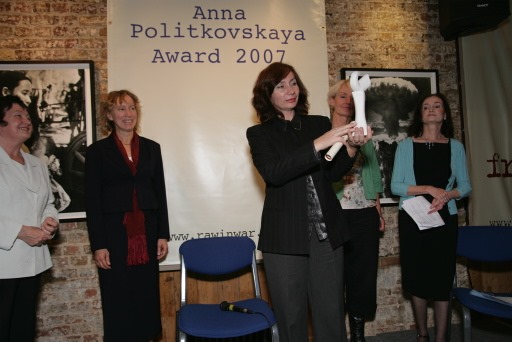
International Federation for Human Rights (FIDH), in the framework of the Observatory for the Protection of Human Rights Defenders
Human Rights Center “Memorial”
Human Rights Watch
Amnesty International
International Partnership for Human Rights (IPHR)
Norwegian Helsinki Committee
Front Line Defenders
World Organisation Against Torture (OMCT), in the framework of the Observatory for the Protection of Human Rights Defenders
RAW in WAR (Reach All Women in WAR)
Board of the EU-Russia Civil Society Forum
Committee Against Torture (CAT)
Public Verdict Foundation
European Human Rights Advocacy Centre (EHRAC)
July 15, 2019 — On the tenth anniversary of the murder of Natalia Estemirova, Chechnya’s most prominent human rights defender, nine international and two Russian human rights groups, jointly with FIDH and its member organization Human Rights Center “Memorial,” call on the Russian authorities to finally fulfil their obligation to conduct a thorough, impartial and effective investigation into her killing, bring the perpetrators to justice in fair trials before ordinary civilian courts and end impunity for human rights violations in Chechnya.
Natalia Estemirova was abducted, apparently by security personnel, near her apartment building in the Chechen capital, Grozny, on the morning of July 15, 2009. Her body was found several hours later in Ingushetia, the neighbouring North Caucasus region, with multiple gunshot wounds.
 From the early nineties, Natalia Estemirova fearlessly fought injustice in Chechnya. At the start of the second Chechen war in autumn 1999, she began working with Human Rights Center “Memorial” and soon became one of its leading activists. She fearlessly documented egregious abuses, first by the Russian military and police and later, by local Chechen security personnel. Her work brought many atrocities to light, including the Russian ballistic missiles strike on Chechnya’s capital, Grozny, killing over 100 civilians in October 1999, the massacre of dozens of civilians in the Chechen village of Novye Aldy in February 2000, and enforced disappearances, torture, extra-judicial killings, and punitive house-burnings by Chechen law enforcement and security agencies in 2007-2009.
From the early nineties, Natalia Estemirova fearlessly fought injustice in Chechnya. At the start of the second Chechen war in autumn 1999, she began working with Human Rights Center “Memorial” and soon became one of its leading activists. She fearlessly documented egregious abuses, first by the Russian military and police and later, by local Chechen security personnel. Her work brought many atrocities to light, including the Russian ballistic missiles strike on Chechnya’s capital, Grozny, killing over 100 civilians in October 1999, the massacre of dozens of civilians in the Chechen village of Novye Aldy in February 2000, and enforced disappearances, torture, extra-judicial killings, and punitive house-burnings by Chechen law enforcement and security agencies in 2007-2009.
In 2008, after she spoke out against the headscarf requirement imposed on women by Chechen authorities, the head of Chechnya, Ramzan Kadyrov, personally threatened her. She also received indirect threats on several occasions, including in the days leading up to her murder. In the last weeks of her life, Estemirova investigated and publicized particularly sensitive cases of abuses by Chechen security officials, including the public execution of Rizvan Albekov in the village of Akhkinchu-Borzoy on July 7, 2009.
Natalia Estemirova’s brave work was recognized and celebrated through several high-profile awards. She received the “Right to Life” award from the Swedish Parliament in 2004 and the European Parliament’s Robert Schuman medal in 2005. In 2007, she received Human Rights Watch’s annual award for extraordinary activism. After the murder of her friend, Anna Politkovskaya in 2006, Estemirova was awarded the first RAW in WAR Anna Politkovskaya Award, established in honour of the murdered Russian journalist.
In January 2010, the Investigative Committee of the Russian Federation, the country’s chief investigation agency, stated that the murder was carried out by an insurgent, Alkhazur Bashaev, who had been killed by the time of the announcement. The Investigative Committee said that Bashaev supposedly committed the crime because Estemirova had implicated him as a recruiter of insurgents. Later, a different official explanation emerged; Bashaev allegedly murdered Estemirova to discredit the government of the Russian Federation and Chechen authorities on the eve of a meeting between Russia’s then-President Dmitry Medvedev and German Chancellor Angela Merkel. This conclusion, backed by testimonies obtained from former insurgents serving long prison terms, was neither reliable nor convincing.
In 2011, FIDH, Novaya Gazeta and Human Rights Center “Memorial” emphasized in their joint report that the inconsistencies in the official version gave grounds to believe that a cover-up version of the events had been created to avoid investigating possible official involvement in the killing, including that of Chechen security officials. On September 20, 2011, Natalia Estemirova’s relatives lodged a complaint to the European Court of Human Rights about the lack of effective investigation into her murder. The case is pending.
“’Memorial’ believes that Estemirova’s murder was connected exclusively to her human rights work. Chechen authorities wanted her silenced. The official version, which attributes her killing to insurgents, falls apart on closer examination. Russian authorities must find and punish the perpetrators, including those who ordered the killing,” said Oleg Orlov, head of the Hot Stops program at Human Rights Center “Memorial”.
Against the backdrop of systematic persecution of human rights defenders in Chechnya, the failure of Russian authorities to conduct an effective investigation into Estemirova’s murder appears to be deliberate. Her killing had disastrous effects on the human rights situation in Chechnya, increasing the level of fear and discouraging local residents from seeking the assistance of human rights defenders. Kadyrov repeatedly labelled human rights defenders as enemies of the people and collaborators of terrorists.
Activists of the Joint Mobile Group of human rights defenders in Chechnya, which played a crucial role in providing legal aid to victims of abuses by local security officials in the years after Estemirova’s murder, were subjected to numerous attacks in 2014-2016. On March 9, 2016, two members of the group and six foreign and Russian journalists traveling to Chechnya were attacked by apparent proxies of Chechen authorities in Ingushetia, near the administrative border with Chechnya. Mobsters, apparently acting on the orders of Chechen authorities, attacked and destroyed the group’s office twice. All of these attacks have been carried out with complete impunity, forcing the group to withdraw from Chechnya due to security concerns.
The efforts made by Chechen authorities to eradicate human rights work in Chechnya culminated in the criminal case fabricated against the successor of Natalia Estemirova, her friend and colleague Oyub Titiev, who took lead of Memorial’s work in Chechnya soon after Estemirova’s death. In January 2018, authorities in Chechnya arrested him on bogus drug possession charges. After 17 months behind bars, Titiev was released on parole in June 2019.
The organisations call on Russian authorities:
-
To conduct a thorough, impartial, independent, and effective investigation into the murder of Natalia Estemirova and bring the perpetrators to justice in fair trials before ordinary civilian courts;
-
To investigate and ensure justice for other attacks on human rights defenders and journalists in Chechnya, including the attacks on activists of the Joint Mobile Group in 2014-2016;
-
To create a favourable working climate for human rights defenders and journalists in Chechnya;
-
To ensure respect for human rights and fundamental freedoms in accordance with international human rights obligations of the Russian Federation.
